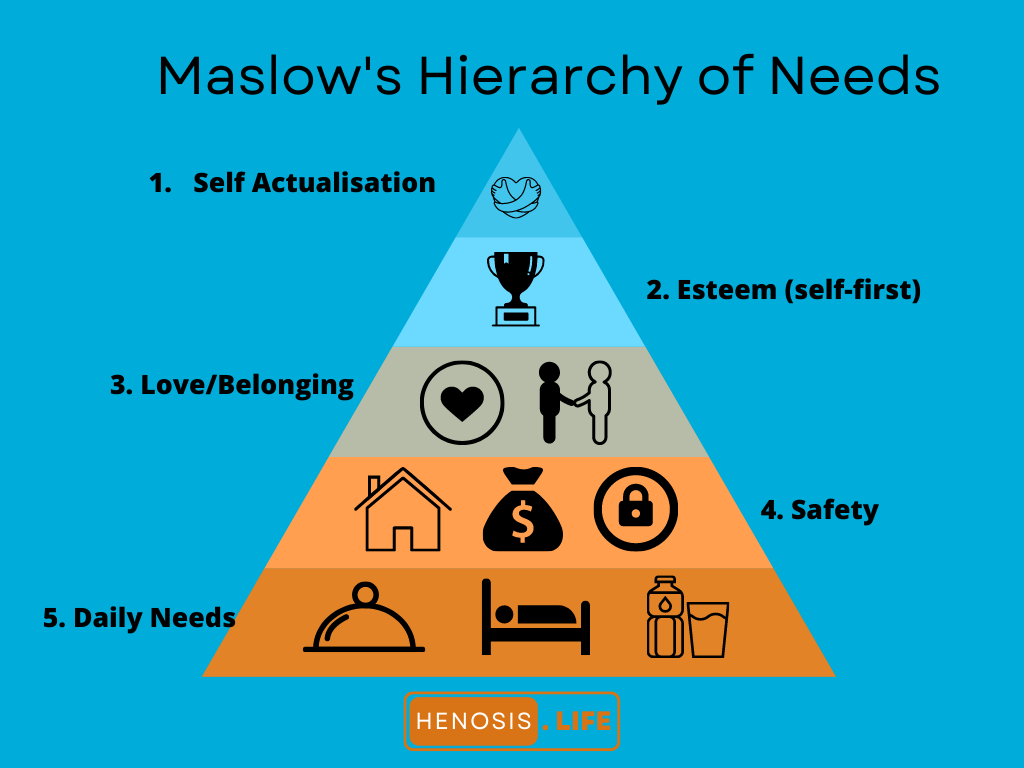Self-actualisation, according to Maslow’s Hierarchy of Needs, is the highest level of human needs that one can achieve. It involves fulfilling one’s potential and achieving personal growth, leading to a deeper sense of inner peace and happiness. However, before we can reach self-actualisation, Maslow proposed that we must first satisfy our basic physiological needs, safety needs, love and belonging needs, and esteem needs.

Esteem needs are crucial in Maslow’s hierarchy, and they involve the desire for respect, recognition, and a sense of accomplishment. While esteem needs are crucial for self-actualisation, it is important to recognise that true self-esteem must come from within oneself. As Maslow himself noted, “What a man can be, he must be,” meaning that we must first believe in our abilities and worth before others can truly recognise and respect us.
This concept of self-esteem has been explored in various psychological theories, including self-determination theory (Deci & Ryan, 2008). According to this theory, our sense of self-esteem and well-being is based on our ability to meet our basic needs and our ability to act autonomously and competently in our lives. Therefore, we must believe in ourselves and our abilities before we can expect others to recognise and respect us.
Flow & Self-Actualisation
Another interesting topic related to self-actualization is the concept of flow. Flow, as defined by psychologist Mihaly Csikszentmihalyi (1990), is the state of complete immersion in an activity, where we lose track of time and feel fully engaged and energized. This state of flow is often experienced when we engage in activities that challenge us but are still within our abilities.
The experience of flow is closely related to self-actualisation because it involves achieving a sense of personal growth and fulfilment. When we are in a state of flow, we are fully engaged in the present moment, which allows us to focus on our goals and personal growth. By engaging in activities that allow us to experience flow, we can achieve a sense of personal growth and fulfilment that is essential for self-actualisation.
Mindfullness
Finally, another interesting topic related to self-actualisation is the role of mindfulness. Mindfulness involves being fully present in the moment and accepting our thoughts and feelings without judgment. This practice has been shown to reduce stress, increase well-being, and promote personal growth and self-actualisation (Keng, Smoski, & Robins, 2011).
By practicing mindfulness, we can become more aware of our thoughts and feelings, which allows us to make more intentional choices and achieve a deeper sense of self-awareness. By developing self-awareness and acceptance, we can move closer to achieving self-actualisation.
In conclusion, self-actualisation is the highest level of human needs that one can achieve. While it requires meeting our basic physiological, safety, love and belonging, and esteem needs, it also involves achieving personal growth and fulfilling one’s potential. By recognising the importance of self-esteem, flow, and mindfulness in our lives, we can move closer to achieving self-actualisation and experiencing a deeper sense of inner peace and happiness.
Sources
- McLeod, S. (2018). Maslow’s Hierarchy of Needs. Simply Psychology. https://www.simplypsychology.org/maslow.html This article provides a detailed overview of Maslow’s hierarchy of needs and how it relates to self-actualization.
- Myers, D. G., & Twenge, J. M. (2019). Social Psychology (13th ed.). McGraw-Hill Education. This textbook provides an in-depth discussion of self-esteem, flow, and mindfulness as they relate to self-actualization.
- Maslow, A. H. (1943). A theory of human motivation. Psychological Review, 50(4), 370-396. https://doi.org/10.1037/h0054346 Maslow’s original article on his hierarchy of needs is a seminal work in the field of psychology and provides a foundation for understanding self-actualization.
- Csikszentmihalyi, M. (1990). Flow: The psychology of optimal experience. Harper & Row. Csikszentmihalyi’s book on flow provides a detailed exploration of how the state of flow relates to personal growth and fulfillment.
- Keng, S. L., Smoski, M. J., & Robins, C. J. (2011). Effects of mindfulness on psychological health: A review of empirical studies. Clinical Psychology Review, 31(6), 1041-1056. https://doi.org/10.1016/j.cpr.2011.04.006 This article provides a comprehensive review of the research on mindfulness and its effects on psychological health, including its relationship to personal growth and self-actualization.
